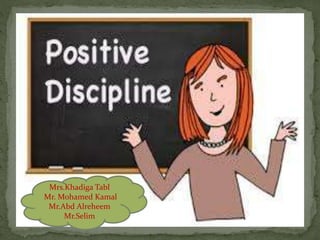
Positive discipline AUC group work
- 1. Mrs.Khadiga Tabl Mr. Mohamed Kamal Mr.Abd Alreheem Mr.Selim
- 3. A brief about Positive Discipline? Positive Discipline is a program designed to teach young people to become responsible, respectful and resourceful members of their communities. Based on the best selling Positive Discipline books by Dr. Jane Nelsen, Lynn Lott, Cheryl Erwin, Kate Ortolano, Mary Hughes, Mike Brock, Lisa Larson and others, it teaches important social and life skills in a manner that is deeply respectful and encouraging for both children and adults (including parents, teachers, childcare providers, youth workers, and others). Recent research tells us that children are “hardwired” from birth to connect with others, and that children who feel a sense of connection to their community, family, and school are less likely to misbehave. To be successful, contributing members of their community, children must learn necessary social and life skills. Positive Discipline is based on the understanding that discipline must be taught and that discipline teaches.
- 4. A History of Positive Discipline the Positive Discipline Parenting and Classroom Management Model is based on the work of Alfred Adler and Rudolf Dreikurs.1 Dr. Adler first introduced the idea of parenting education to United States audiences in the 1920s. He advocated treating children respectfully, but also argued that spoiling and pampering children was not encouraging to them and resulted in social and behavioral problems. The classroom techniques, which were initially introduced in Vienna in the early 1920s, were brought to the United States by Dr. Dreikurs in the late 1930s.Dreikurs and Adler refer to the kind and firm approach to teaching and parenting as “democratic.”
- 5. What is Positive Discipline based on ? Dr. Adler first introduced the idea of parenting education to United States audiences in the 1920s. He advocated treating children respectfully, but also argued that spoiling and pampering children was not encouraging to them and resulted in social and behavioral problems. The classroom techniques, which were initially introduced in Vienna in the early 1920s, were brought to the United States by Dr. Dreikurs in the late 1930s. Dreikurs and Adler refer to the kind and firm approach to teaching and parenting as "democratic."
- 6. The tools and concepts of Positive Discipline include: The Positive Discipline Parenting and Classroom Management models are aimed at developing mutually respectful relationships. Positive Discipline teaches adults to employ kindness and firmness at the same time, and is neither punitive nor permissive. • Mutual respect. Adults model firmness by respecting themselves and the needs of the situation, and kindness by respecting the needs of the child. • Identifying the belief behind the behavior. Effective discipline recognizes the reasons kids do what they do and works to change those beliefs, rather than merely attempting to change behavior. • Effective communication and problem solving skills. • Discipline that teaches (and is neither permissive nor punitive). • Focusing on solutions instead of punishment. • Encouragement (instead of praise). Encouragement notices effort and improvement, not just success, and builds long-term self-esteem and empowerment.
- 7. Who is Positive Discipline for? There is a Positive Discipline program for parents and another for teachers. Both are based on the same principles, but are tailored for the particular issues that parents and teachers face.
- 8. Why is Positive Discipline Important? Positive discipline: • Teaches children responsibility, self-discipline, problem-solving skills and cooperation. • Is respectful to both children and adults. • Builds trust and strengthens relationships, helping form new connections in a child’s brain. • Builds and maintains self-esteem. • Teaches children how to manage their emotions. • Teaches children to deal with stress in healthy ways. • Invites children to contribute in meaningful ways and develops their sense of significance. • Develops strong understanding that one has power or influence over what happens to them in life.
- 9. How does the Positive Discipline program for parents differ from other parenting approaches? Positive Discipline for parents: • was designed as a universal program, for typical families facing typical challenges, rather than “high-risk” families. • is based in attachment, relationships and communication, rather than rewards and punishments. • builds on parents’ strengths. • covers all of childhood, from birth to adolescence. • helps parents learn how to problem-solve across a wide range of situations, rather than prescribing “what to do when”. • comes from a child rights perspective, so it focuses on enhancing mutual respect between parents and children. • originated as a culturally inclusive approach, so it builds on “parenting universals”.
- 10. How is Positive Discipline applied in the classroom? Positive Discipline for teachers: • is based on established pedagogical principles, as well as child rights principles. • considers the long-term impact of the teaching relationship on children’s lives and attitudes toward learning. • helps teachers learn how to provide effective mentorship within a safe learning environment. • provides relevant information about children’s neurological, intellectual and social development from birth to adolescence. • recognizes the importance of individual differences in children’s experiences, temperaments and information processing. • focuses on problem-solving rather than rewards and punishment.
- 11. Five Criteria for Effective Discipline : Jane Nelsen gives the following criteria for “effective discipline that teaches”: 1. Helps children feel a sense of connection (belonging and significance). 2. Is mutually respectful and encouraging (kind and firm at the same time). 3. Is effective long-term (considers what the child is thinking and feeling, learning, and deciding about himself and his world, and what to do in the future to survive or to thrive). 4. Teaches important social skills and life skills (respect, concern for others, problem solving, and cooperation as well as the skills to contribute to the home, school, or larger community). 5. Invites children to discover how capable they are (encourages constructive use of personal power and autonomy).
